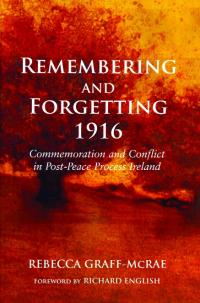Remembering and forgetting 1916: commemoration and conflict in post-Peace Process Ireland
Published in 20th-century / Contemporary History, Book Reviews, Issue 1 (Jan/Feb 2011), Reviews, Volume 19
Remembering and forgetting 1916: commemoration and conflict in post-Peace Process Ireland
During a speech last May in UCD, delivered to the Institute of British–Irish Studies (IBIS), Brian Cowen spoke with a sense of both foreboding and cautious expectation about the prospect of entering a long decade of commemoration. From 2012 to 2022 all Ireland will come face to face with a procession of potentially volatile centenaries. In a candid moment, Cowen stated:
‘Commemoration, of course, is a selective act. We choose what to commemorate and how to commemorate it. We decide that some events are worth remembering, honour them with exhibitions and pageants, films and novels. Others are quietly forgotten. We commemorate what we believe to be important.’
To a historian untroubled by the politics of Irish historiography, this comment might raise issues. Is this the ‘royal we’—Pluralis Majestatis—or ‘we’ the citizens of Ireland? Is there some covert agency inside the Department of An Taoiseach, ‘we’ might also wonder, where anonymous apparatchiks decide who gets honoured and who is ‘disappeared’ down the memory hole?
Despite the apparent simplicity of Cowen’s statement, it veils a complex amalgam of considerations about the intersection of history, memory and identity at play in the field of remembrance. The permission to narrate about Ireland’s past is not a trouble-free matter. Those who dig deep into the archive of both documentation and memory soon become aware of the discursive partitions between dominant and marginalised narratives. Political legitimacy, visibility, silence and unfinished business are all constraints placed upon interpretation. Those who dissent from agreed versions of the past are often sidelined and isolated. Consensus, political expediency and ambiguity override scholarship and dictate what history is.
Commemoration is never straightforward. The unveiling of a memorial in Messines and the laying of a wreath by a Sinn Féin lord mayor of Belfast to the fallen of the Great War are recent examples of how commemoration has the ability to both make and re-make history. Analysis of commemoration and the alchemical wedding between remembering and forgetting has produced some stimulating essays and studies in recent years by Ireland’s finest historians, most notably Kevin Whelan, Anne Dolan and Duncan Greenlaw, and useful edited collections by Ian McBride, Eberhard Bort, Mary Daly and Margaret O’Callaghan. Rebecca Graff-McRae’s analysis builds on all this work but is structured within theoretical scaffolding that will be foreign to the average History Ireland reader—indeed, to most tenured history lecturers in Ireland. Coming to terms with Jacques Derrida’s theory of spectrality or comprehending the strategies of political deferral by the wild man of post-psychoanalytic philosophy Slavoj ?i?ec will produce discomforting side-effects in those who still believe that history is about the archival pursuit of ‘objectivity’ and ‘truth’. Some will wonder whether such newfangled theories have any place in the sacred confines of the Irish past. Or will deconstructionist jargon become the final refuge for the revisionist project in the age of post-revisionism? Whatever you want the answer to be, commemoration lends itself to multiple deconstructionist approaches, and Graff-McRae’s analysis isn’t short on provocative thinking and analytical originality.
Four substantial chapters deal with the four intersecting themes that have dominated historiography over the last two decades: the legacy of 1916, the dis-remembering and re-remembering of the Somme, the bicentenary of 1798 (coinciding with the Good Friday Agreement), and the 25th anniversary of the 1981 hunger strike. The commemoration of each of these moments is in a perpetual unresolved condition of overlap, mutual reinforcement, recall and rewrite. Rebellious ghosts bridge time and space, communicating through the historical ether. Their appearance causes perceptible ruptures in the present. If history is the gateway to legitimacy, commemoration becomes the continuation of politics by other means.
The location of Graff-McRae’s own allegiance is evident from the effusive foreword by Richard English and the burnt orange tone of the dust-jacket. Her critique of the internecine politics of contemporary republicanism takes us to the very margins of competing ideologies dividing Fianna Fáil, Sinn Féin and Republican Sinn Féin. Her analysis provides valuable insight into the atomised state of the republican ideal. The author is also transparent enough to ask the reader to consider ‘[w]hat moments and voices have been excluded or marginalised or forgotten both in this work and in wider discourses of commemoration in Ireland’. The question is not rhetorical and merits an answer.
A good dose of conscious reflection about the causes of conflict might be no bad place to start for communities still troubled by questions of identity and common purpose. If the aspiration to shared history is to succeed, it must shy away from the discordant binaries produced by the persistent performative cycles dividing nationalist/unionist, North/South, Protestant/Catholic etc. With the right political will, commemoration might be transformed into a stage of rememorising the common ground and debating the larger issues that have been lost in the mutilations of the past.
When an Irish Times leader asked on 18 November 2010 ‘Was it for this?’ and wondered whether the men of 1916 died for a bail-out by the German chancellor, the idealism of the Rising was invoked as a measure of the present crisis. But would it have been equally appropriate to ask whether those who died in the trenches in a Great War ‘for civilisation’, or a war ‘to end all wars’, or ‘a war to unite us’, should be any more satisfied with our human condition? ‘We’ could constructively begin ‘the wider discourse of commemoration’ by collectively reconsidering the causes of the war and the foundation of peace. HI
Angus Mitchell is currently preparing Spanish and Portuguese editions of The Amazon Journal of Roger Casement for publication in 2011.
















